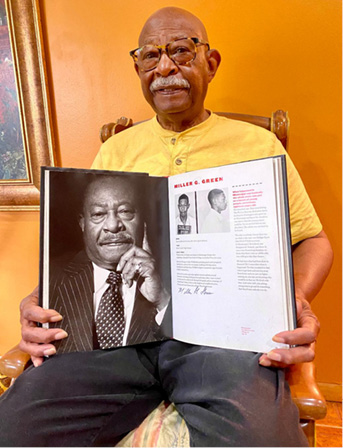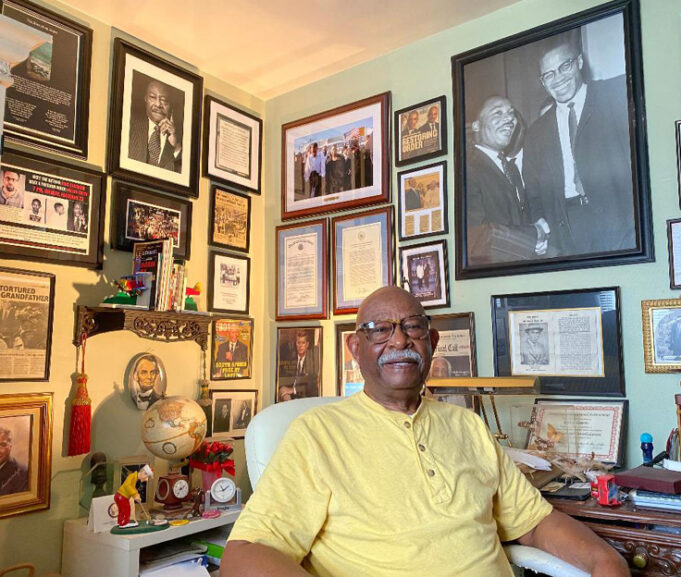CHICAGO—With the 60th anniversary of the March on Washington in his rear-view mirror, former Freedom Rider Miller Green looks forward to a time when Black people will move to be free of fighting for “Jobs and Freedom,” to a time when Black leaders advocate for self-sufficiency and true independence.
“I see it as just a march with nothing much coming behind it,” Mr. Green said of the recent march. “We keep doing the same thing over and over again. We march just to be marching. If you’re not putting pressure on anybody, you’re not going to get anything.”
The 80-year-old former Mississippi resident who now resides in a Chicago suburb is critical of the dependency of Black leadership on the Democratic Party. Black people put Joe Biden in office, he said, but what was the return?
“We put a man in the White House whose campaign was in the tank,” he said. “The question is, what has he done for the people who put him in? The Asian Caucus is interested in Asians. The Hispanic Caucus is interested in Hispanics. The Black Caucus is interested in the Democratic Party.”
Mr. Green yearns for leadership with the spirit of Freedom Riders, a movement he joined at the age of 18. Freedom Riders was an integrated group of civil rights activists who took bus trips through the South to protest segregated bus terminals. Many were beaten and jailed, some were killed. The 1963 March on Washington for Jobs and Freedom, which Green supported and attended was noted for Dr. King’s famous “I Have a Dream” speech.
Mr. Green was arrested in 1961 as he led a small group of teens who attempted to buy a Trailways bus ticket in Jackson, Miss., to New Orleans. When police realized the teens were residents of Jackson, they were told to go home. But Mr. Green and the group refused. They wanted to be arrested because then-Gov. Ross Barnett was painting a narrative that protesters were “just outside agitators” stirring up trouble.
The strategy of getting Mississippi residents to participate in the Freedom Rides was explained to Mr. Green by civil rights leader Rev. James Bevel. The teens were sitting in a local restaurant when “a man walked in with overalls on. That was unusual. He introduced himself as James Bevel and told us he wanted to help change things.”
“He was a master salesman,” Mr. Green continued. “He could go into any home and talk to the parents and get them to believe. He doesn’t get the credit he should have gotten. He was like a lone ranger. He was the one who went into schools to get the kids.”

Mr. Green became disenchanted as a child with going to church every Sunday but seeing Whites violently attack and kill Blacks. He thought, why is God letting this happen? His discontent was reinforced when the adults he knew didn’t step up to protest the discrimination practiced by the bus companies.
The jails began to fill as more Freedom Riders arrived in Jackson on buses. Mr. Green recalled seeing a White family viewing a replica of a hangman’s gallows erected in the jail with photographs of Black victims. “It was like a museum for White folks,” he recalled.
Mr. Green said the strategy was to fill the jails so the city and state governments would have to expend physical and financial resources to accommodate prisoners.
“I got a Ph.D. in prison being so young and around Freedom Riders. There were all kinds of talent in there. Students in colleges and recent college graduates. There was a psychiatrist who went on a hunger strike; I would watch him question the people in charge of the prison,” he told The Final Call.
Once released, Mr. Green joined the Congress on Racial Equality (CORE) led by James Farmer. They must have “seen something in me because they kept giving me work,” he explained.
Mr. Green would drive the car of Medger Evers to do civil rights work; he thought of Dr. Martin Luther King Jr. as a prophet of his time; Malcolm X was “frightening to most people;” Medgar Evers had courage. Later in life he moved to Chicago and was a “foot soldier” for Rev. Jesse Jackson’s Operation Breadbasket (now Rainbow PUSH) organization.
Mr. Green admires the Honorable Minister Louis Farrakhan for having the courage “to say what needs to be said” regardless of the consequences. One of his greatest memories was on the Washington Mall during the Million Man March.
“I remember sitting on the ground and I called my mother and started crying,” he recalled. “She told me, ‘You got your wish, to see Black men stand up.’ But if I had listened to others, I would have missed it.
“I told myself if a man got enough courage to call a million men, I don’t want to have somebody tell me about it. I want to be there myself,” he concluded.
Most recently, Mr. Green was inspired by the so-called “Birmingham Brawl,” when Black onlookers came to the aid of a Black man in Alabama attacked by Whites while trying to move them so a large boat could dock.
“Half the people in leadership positions today say they were part of the civil rights movement, but they weren’t,” he said. “We opened the door, and they ran in.
“I’ve seen how Black men have been broken down because of fear. I’ve lived with racist people, and we survived it. Now is the time to say to hell with a system that we’re not getting anything from,” he said.













